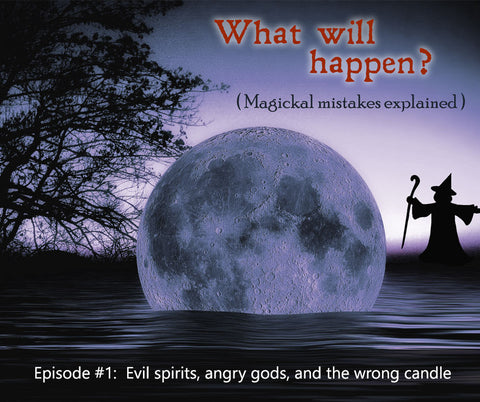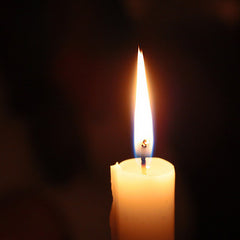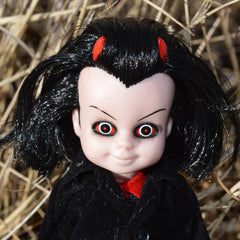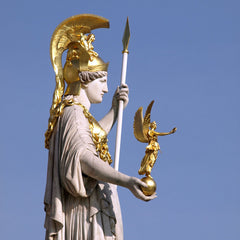
Welcome to “What Will Happen?”, a special blog post about breaking the rules of magick.
We all know the conventions: Use a pink candle for romance. Do banishing magick during the waning moon. Never cast a curse, lest it return to you threefold.
But sometimes, when thumbing through yet another Witchcraft 101 book, you hear that devilish little voice: Oh yeah? Says who? Does “should not” mean “must not”? And, most importantly, what will happen?
Every action has consequences. You just need to know how bad the consequences might be. So let’s consider the best and worst possible outcomes when Witches do things they’re not supposed to do. For starters:
What will happen if I use the wrong color candle?

A pretty typical magickal hang-up is to dwell on the specific components of a spell. Beginners often want to make sure they have every ingredient in its place. This thoroughness isn’t a bad thing. Sloppy preparation and wonky substitutions are, indeed, one of the major reasons that magick fails.
But most of the time, the verbatim approach isn’t necessary. This isn’t a fantasy novel—you’re not going to awaken a buried fire-giant just because there was a typo in the Elven script. In fact, your spell will probably benefit from some conscious customization. Choosing words, colors, and symbols that resonate with your will is always allowed.
But what if the substitution is less than purposeful? What if you use the wrong color candle because it’s all that was available, or because you’re misinformed? Not to worry (too much). The most important spell ingredient is your intention, so chances are good that the working will still go as planned.
However, spell components—colors, plants, stones, scents—each have a particular energetic signature. If they didn’t, they wouldn’t be so useful to the Witch. There is a danger that their properties could contaminate or conflict with the purpose of the working. If you don’t have the supplies you need, leave them out. Or at least choose something that complements your intention.
The best case: Your spell works anyway! Go you!
The worst case: Your spell picks up some energies that you did not intend.
What will happen if I summon an evil spirit?

Magick necessarily makes contact with what we might call non-normal reality. Some of that “non-normal” is also non-nice. Many of the mechanics of ritual magick—the incense, the prayers, the magick circle—are designed to help the intrepid psychonaut to make contact with other worlds while steering clear of baddies.
Baddies? Yeah, it doesn’t matter much whether you think of them as demons, evil ghosts, grumpy elder gods, or nasty astral currents. These guys (and gals, and slithering sexless insectoids, if we’re fair about it) have the ability to turn your transcendent magickal experience into something unpleasant.
You know the expression, “A little knowledge is a dangerous thing”? This is certainly the case with evocation magick. Talented beginners are at the most risk, because they have the ability to make contact with harmful energies without necessarily having the skill to manage the encounter.
How much harm can an uncontrolled entity really cause? Practicing magicians can debate all day long about whether visions and apparitions of spirits are objectively “real.” Some see them as manifestations of the shadow, or hidden self. Some say that demons serve the magician as challengers or gatekeepers, provoking spiritual growth through discomfort. But that’s little consolation to someone who’s experiencing a haunting or possession. In extreme cases, entity attachments have led to madness, injury, and death.
My experience has shown me that there is a certain amount of protection for humans pursuing a magickal calling. There are boundaries between the worlds, and Guardians charged with preserving those boundaries.
Yet there is no gain without risk. I will never argue that magick is safe. If you’re going to commune with spirits or go knock-knocking in strange astral neighborhoods, it’s smart to learn some basic techniques of psychic protection. Confide your experiences in a mentor or a trusted friend. And get help if you evoke something that won’t go back to where it came from.
The best case: You fly with fairies, dance with unicorns, and visit the abodes of the Mighty Dead. You stumble upon one of the nastier backwaters of the Otherworld and come back stronger for the experience.
The worst case: You get possessed, go crazy, destroy yourself and everything you love.
What will happen if I offend a deity?

Invocation is the act of inviting a god to share space with the worshiper. All world religions have it in some form in their prayers, rituals, and sacraments.
For Witches and Pagans, however, invocation can be extremely personal. The Wiccan rite of Drawing Down the Moon is meant to invoke the Goddess into the actual body of the High Priestess. Possessory rites exists in Norse and Afro-Caribbean magick, too. Many Pagans have a personal relationship with one or more patron gods, who feel more like mentors and family members than distant entities. As Pagans, we accept that there isn’t just one god—there are many, all with different personalities.
With all these gods and all this closeness, misunderstandings are bound to happen, right? World mythologies are full of stories about the fates of mortals who have displeased the big guys. What happens if you get on a deity’s bad side? (None of this applies to non-theistic Witches. All they have to worry about is pissing off other Witches.)
It depends on the god, of course. I’m sure there are vengeful and petty gods who are capable of throwing you a trick or two. But most of the gods that Pagans follow exemplify the best that we are capable of as humans. Their attitudes toward us range from amused tolerance to pure unconditional love. They’re bigger, older, and wiser than us—why should they lose their cool over our screw-ups?
Still, if you want to have a productive relationship with a deity, it pays to cultivate one. Patronage is a two-way exchange. Learn what pleases them, what displeases them, what types of offerings and actions are likely to get their attention. One priestess I know speaks of “courting” the Goddess. In other words, don’t just invoke Her and expect Her to show up—be the kind of dancer She’d like to dance with.
My tradition teaches that deities are a lot like us—albeit older, more powerful versions of us. They are bundles of consciousness experiencing the world. The change and evolve like we do. They marvel at us as we marvel at them. They are partners to be honored, not bosses to be feared.
Be respectful, be sincere. Don’t worry so much about stepping on Isis’s toes.
The best case: Your slight is pardoned by the gods, your relationship grows.
The worst case: Look at what happened to Arachne, Cassandra, Prometheus, and like, a hundred people in the Bible. Just saying.
This has been “What Will Happen?”, a brand new feature for magickal contrarians. We’ll be posting new episodes when we feel like it. In the meantime, check out some other articles in the archive!
